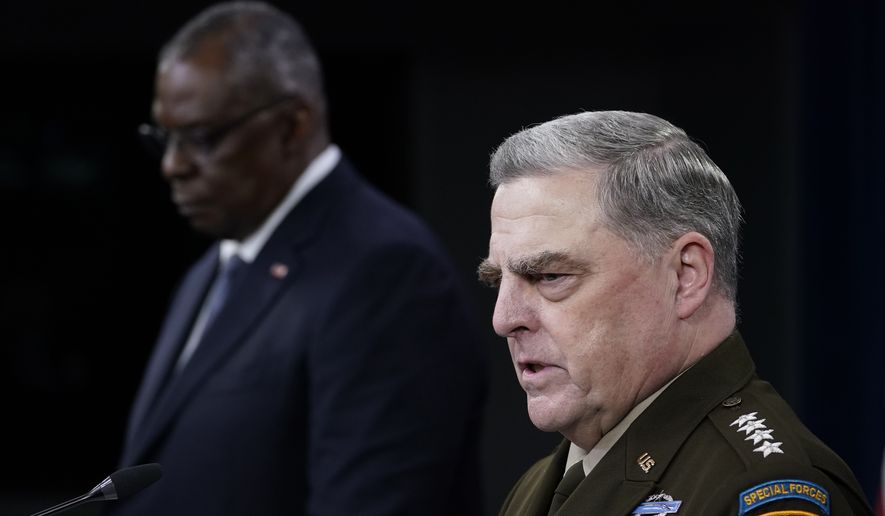Senior leaders from the Department of Defense will testify before the Senate Armed Services Committee on the withdrawal from Afghanistan, the committee announced Thursday.
The committee chairman, Sen. Jack Reed, said he had concerns and questions regarding the rapid pullout and its aftermath.
“Although we have completed the withdrawal of American military personnel and over 100,000 civilians from Afghanistan, I remain deeply concerned about the events that accompanied our withdrawal and the ongoing humanitarian crisis,” Mr. Reed, Rhode Island Democrat, said in a statement. “It is the duty of Congress — and the Senate Armed Services Committee in particular — to hold hearings to learn lessons from the situation in Afghanistan and ensure accountability at the highest levels.”
The testimony is scheduled to take place in a series of open and closed briefings and hearings beginning next week.
The committee will hold a closed briefing Sept. 15 by Commander of U.S. and NATO forces in Afghanistan Gen. Austin “Scott” Miller on “recent developments in Afghanistan.”
On Sept. 28, the committee will hold both open and closed hearings on the withdrawal with testimony from Secretary of Defense Lloyd Austin, Chairman of the Joint Chiefs of Staff Gen. Mark Milley, and U.S. Central Command Commander Gen. Kenneth F. McKenzie, Jr.
The committee will also hold a “Review of U.S. Military Operations in Afghanistan” on Sept. 30 featuring testimony from yet-to-be-determined external experts.
The testimony schedule was released a day after several Republicans on the committee sent Mr. Reed a letter urging him to compel top brass at the Pentagon to testify.
“I’m grateful to Chairman Reed for prioritizing these critical oversight hearings on Afghanistan — the first of what I will expect to be many hearings and briefings to review and determine what happened, who should be held accountable, and how we move forward,” said Sen. James M. Inhofe of Oklahoma, the committee’s ranking Republican. “The American people, our service members past and present, our allies and partners around the world, and the Afghans who bravely helped us deserve this transparency and accountability.”
The committee hearings add to Congress’ growing oversight of the chaotic ending to the two-decade war, which left close to 100 U.S. citizens stranded in the Taliban-controlled country.
House and Senate members on both sides of the aisle are pressing the administration for insight into key decisions made leading up to and throughout the withdrawal that left the U.S. military flatfooted while the Taliban took control of the country.
While the Pentagon has been spared much of the vitriol from GOP lawmakers, some have called for the top brass to resign.
Sen. Marsha Blackburn, one of the co-signers on Wednesday’s letter, called on Mr. Austin and Gen. Milley to resign as the pullout unraveled.
“Defense Secretary Lloyd Austin knew Americans were stranded and failed to get Americans home. He should resign,” Mrs. Blackburn, Tennessee Republican, said on Twitter just days before the U.S. troops completed the pullout in late August.
Still, Mr. Reed has said his focus will remain on lessons to be learned, rather than political finger-pointing.
“There are no easy answers to how we got here,” Mr. Reed said in a mid-August statement as Kabul fell to the Taliban. “I would argue that several factors over the last twenty years of war in Afghanistan have shaped this outcome and must be considered as we move forward and engage in future conflicts.”
“This is not a Democratic or a Republican problem,” he said. “These failures have been manifesting over four presidential administrations of both political parties.”
• Joseph Clark can be reached at jclark@washingtontimes.com.




Please read our comment policy before commenting.